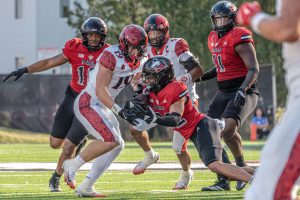All bottled up
April 28, 2004
The assumption that bottled water is higher quality than tap water is more a myth than a certainty, said William Oleckno, NIU public health professor and a water quality expert.
Americans are drinking more bottled water than ever before, according to the U.S. Food and Drug Administration. Americans drank five billion gallons of bottled water in 2001, according to the FDA.
Of the 17.6 eight-ounce servings of beverages Americans consume daily, 6.1 servings are water, and 2.3 servings are bottled water, according to the International Bottled Water Association.
The FDA regulates bottled water products, and the Environmental Protection Agency regulates tap water, Oleckno said. The FDA has adopted the same standards as the EPA for tap water, he said. Consequently, bottled water standards for contaminants are similar to tap water standards.
However, some standards are different, graduate assistant Kate Madden said. When it comes to the possibilities of lead in drinking water, the EPA allows 15 parts per billion in tap water. For bottled water, however, the FDA allows only five parts per billion, she said.
The Clean Water Act of 1972 ensures testing is monitored by the EPA. Before water is distributed to consumers in DeKalb, it is tested for harmful organisms or unhealthy levels of any element, according to the DeKalb Sanitary District.
Tap water and bottled water are pretty equal from a health standpoint, Oleckno said.
To stay healthy, one should drink 64 ounces of water per day, Madden said, which is equivalent to eight 8-ounce glasses.
With bottled water costing students $1.25 at campus vending machines, drinking tap water may be an alternative to save money.
Junior accountancy major Lisa Huynh said she prefers bottled water.
Huynh said she drinks about three bottles of water a day. If she bought water from campus vending machines, she’d spend more than $25 a week on water. Instead, Huynh said she buys a 24-pack of 16.9 oz. bottles for $4.98 at the grocery store.
Many people may prefer the taste of bottled water, Oleckno said.
Fifty-six percent of those who drink bottled water said they do so because of taste, and 55 percent said convenience has the strongest influence on their decision to drink bottled water, according to the International Bottled Water Association.
The bad taste or odor of tap water may be because of chlorine present in the water, Oleckno said. The levels of chlorine are not harmful but can cause an unpleasant taste.
Unlike tap water, the disinfection process for bottled water is done by ultraviolet light, in which no chlorine is added, Oleckno said.






